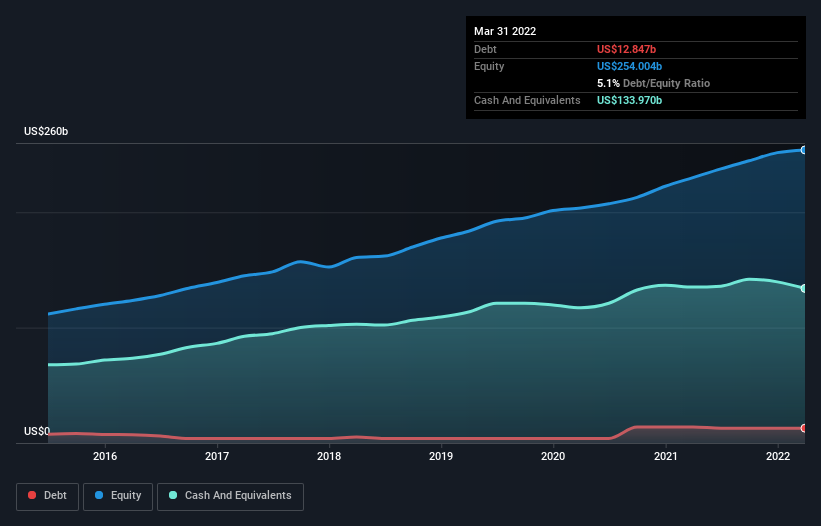- United States
- /
- Interactive Media and Services
- /
- NasdaqGS:GOOGL
Alphabet (NASDAQ:GOOGL) Seems To Use Debt Rather Sparingly
Legendary fund manager Li Lu (who Charlie Munger backed) once said, 'The biggest investment risk is not the volatility of prices, but whether you will suffer a permanent loss of capital.' So it might be obvious that you need to consider debt, when you think about how risky any given stock is, because too much debt can sink a company. We note that Alphabet Inc. (NASDAQ:GOOGL) does have debt on its balance sheet. But is this debt a concern to shareholders?
Why Does Debt Bring Risk?
Debt assists a business until the business has trouble paying it off, either with new capital or with free cash flow. Part and parcel of capitalism is the process of 'creative destruction' where failed businesses are mercilessly liquidated by their bankers. However, a more frequent (but still costly) occurrence is where a company must issue shares at bargain-basement prices, permanently diluting shareholders, just to shore up its balance sheet. Of course, plenty of companies use debt to fund growth, without any negative consequences. When we think about a company's use of debt, we first look at cash and debt together.
View our latest analysis for Alphabet
How Much Debt Does Alphabet Carry?
The image below, which you can click on for greater detail, shows that Alphabet had debt of US$12.8b at the end of March 2022, a reduction from US$13.8b over a year. But it also has US$134.0b in cash to offset that, meaning it has US$121.1b net cash.

A Look At Alphabet's Liabilities
According to the last reported balance sheet, Alphabet had liabilities of US$61.9b due within 12 months, and liabilities of US$41.1b due beyond 12 months. On the other hand, it had cash of US$134.0b and US$35.6b worth of receivables due within a year. So it actually has US$66.5b more liquid assets than total liabilities.
This surplus suggests that Alphabet has a conservative balance sheet, and could probably eliminate its debt without much difficulty. Simply put, the fact that Alphabet has more cash than debt is arguably a good indication that it can manage its debt safely.
In addition to that, we're happy to report that Alphabet has boosted its EBIT by 66%, thus reducing the spectre of future debt repayments. When analysing debt levels, the balance sheet is the obvious place to start. But ultimately the future profitability of the business will decide if Alphabet can strengthen its balance sheet over time. So if you want to see what the professionals think, you might find this free report on analyst profit forecasts to be interesting.
Finally, a company can only pay off debt with cold hard cash, not accounting profits. Alphabet may have net cash on the balance sheet, but it is still interesting to look at how well the business converts its earnings before interest and tax (EBIT) to free cash flow, because that will influence both its need for, and its capacity to manage debt. Over the last three years, Alphabet recorded free cash flow worth a fulsome 88% of its EBIT, which is stronger than we'd usually expect. That puts it in a very strong position to pay down debt.
Summing up
While it is always sensible to investigate a company's debt, in this case Alphabet has US$121.1b in net cash and a decent-looking balance sheet. The cherry on top was that in converted 88% of that EBIT to free cash flow, bringing in US$69b. So we don't think Alphabet's use of debt is risky. Above most other metrics, we think its important to track how fast earnings per share is growing, if at all. If you've also come to that realization, you're in luck, because today you can view this interactive graph of Alphabet's earnings per share history for free.
Of course, if you're the type of investor who prefers buying stocks without the burden of debt, then don't hesitate to discover our exclusive list of net cash growth stocks, today.
New: Manage All Your Stock Portfolios in One Place
We've created the ultimate portfolio companion for stock investors, and it's free.
• Connect an unlimited number of Portfolios and see your total in one currency
• Be alerted to new Warning Signs or Risks via email or mobile
• Track the Fair Value of your stocks
Have feedback on this article? Concerned about the content? Get in touch with us directly. Alternatively, email editorial-team (at) simplywallst.com.
This article by Simply Wall St is general in nature. We provide commentary based on historical data and analyst forecasts only using an unbiased methodology and our articles are not intended to be financial advice. It does not constitute a recommendation to buy or sell any stock, and does not take account of your objectives, or your financial situation. We aim to bring you long-term focused analysis driven by fundamental data. Note that our analysis may not factor in the latest price-sensitive company announcements or qualitative material. Simply Wall St has no position in any stocks mentioned.
About NasdaqGS:GOOGL
Alphabet
Offers various products and platforms in the United States, Europe, the Middle East, Africa, the Asia-Pacific, Canada, and Latin America.
Outstanding track record with excellent balance sheet.
Similar Companies
Market Insights
Community Narratives




